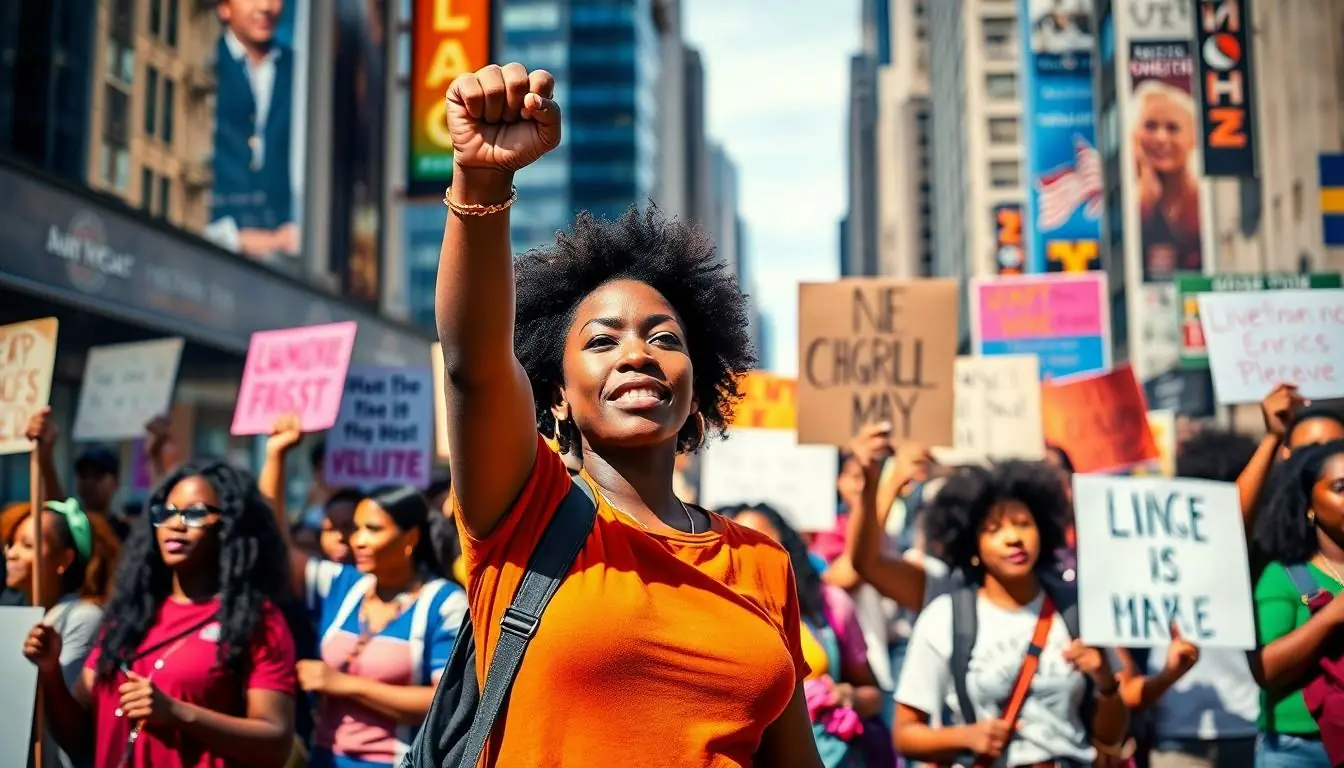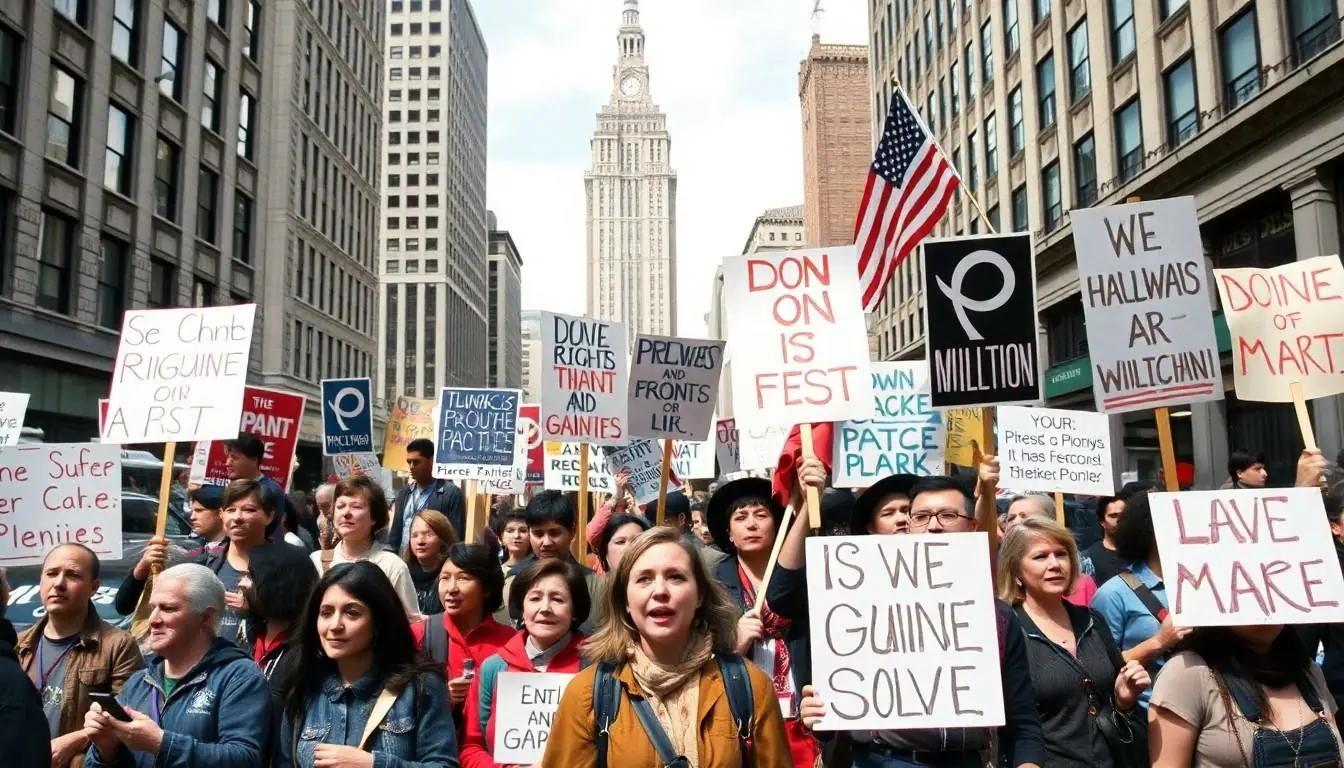The 1960s weren’t just about bell-bottoms and rock ‘n’ roll; they were a whirlwind of political upheaval that reshaped the world. From civil rights to anti-war protests, this decade was a stage for passionate voices demanding change. It was a time when people took to the streets, armed with slogans and a fierce determination to make their mark.
Picture it: a generation fueled by hope and a dash of rebellion, challenging the status quo like never before. These movements didn’t just echo through the streets; they reverberated in the hearts of millions. Dive into the vibrant tapestry of the 1960s political landscape, where every protest was a step toward a more just society, and discover how these bold actions continue to inspire today.
Table of Contents
ToggleOverview of 1960s Political Movements
The 1960s witnessed a wave of political movements that reshaped American society. Activists focused on civil rights, seeking to end racial segregation and discrimination. Organizations like the NAACP and SNCC played vital roles in advocating for equality. Protests, such as the March on Washington in 1963, gathered large crowds demanding justice and civil liberties.
Anti-war sentiment surged during the Vietnam War. Many people opposed U.S. military involvement, believing it caused unnecessary suffering. Groups like Students for a Democratic Society led protests, rallying college students to question U.S. foreign policy. Demonstrations escalated, culminating in significant events like the 1968 Democratic National Convention protests.
The Women’s Liberation Movement gained momentum. Activists sought equal rights and opportunities for women, challenging traditional roles. Events like the Miss America protest in 1968 highlighted sexism and sparked discussions about gender equality.
Additionally, the LGBTQ+ rights movement began to organize. The Stonewall Riots of 1969 marked a turning point in the fight for gay rights. These confrontations galvanized activism, inspiring future generations to advocate for LGBTQ+ equality.
Each movement contributed to a cultural shift, fostering critical discussions around social justice and human rights. The legacy of these 1960s political movements continues to influence current advocacy efforts and inspire new generations committed to change. Activism and engagement from that decade inform today’s conversations surrounding equality, peace, and justice.
Key Movements and Their Goals
The 1960s featured several pivotal movements, each dedicated to addressing social injustices and advocating for change.
Civil Rights Movement
The Civil Rights Movement aimed to eliminate racial discrimination and segregation in the United States. Notable organizations like the NAACP and SNCC mobilized grassroots efforts across the nation. Landmark events such as the March on Washington in 1963 showcased the demand for equality, culminating in Martin Luther King Jr.’s iconic “I Have a Dream” speech. Activists sought legislative reforms, leading to the Civil Rights Act of 1964 and the Voting Rights Act of 1965, which were crucial in advancing human rights for African Americans.
Anti-Vietnam War Movement
The Anti-Vietnam War Movement arose in response to growing discontent with U.S. military involvement in Vietnam. Activists, particularly college students, played a key role, organizing protests and demonstrations nationwide. Groups like Students for a Democratic Society called attention to the moral implications of the war, emphasizing the loss of life and economic resources. Iconic events, such as the Kent State University protest in 1970, highlighted the heightened tensions and urged the government to pursue peace instead of conflict.
Women’s Liberation Movement
The Women’s Liberation Movement focused on achieving equal rights and challenging traditional gender roles. Activists sought equal pay, reproductive rights, and an end to workplace discrimination. The Miss America protest in 1968 drew significant media attention, symbolizing the fight against objectification and patriarchy. Legal advances, such as the passing of Title IX in 1972, helped break down barriers in education and employment, furthering the cause of gender equality throughout society.
Major Figures in 1960s Political Movements
Influential leaders emerged in the 1960s, shaping political movements and advocating for social change. Their contributions defined the era.
Martin Luther King Jr.
Martin Luther King Jr. championed civil rights through nonviolent resistance. He inspired millions with his vision for equality and justice. King’s leadership during the March on Washington in 1963 solidified his role as a key figure. His famous “I Have a Dream” speech emphasized hopes for a racially integrated and harmonious America. Legislative achievements, including the Civil Rights Act of 1964 and the Voting Rights Act of 1965, showcased the movement’s impact. His influence extended beyond the 1960s, leaving a lasting legacy in the fight for human rights.
Gloria Steinem
Gloria Steinem emerged as a prominent voice in the Women’s Liberation Movement. She co-founded Ms. Magazine in 1972, providing a platform for feminist issues. Steinem’s activism sought to challenge traditional gender roles and advocate for equality in various spheres, including education and employment. She emphasized the importance of women’s rights in broader social justice discussions. Key events, such as the Miss America protest in 1968, highlighted her commitment to exposing societal injustices. Her ongoing advocacy continues to inspire new generations of feminists.
Malcolm X
Malcolm X played a pivotal role in the civil rights struggle with a more militant approach. He advocated for Black empowerment and self-defense against systemic oppression. His speeches galvanized young activists, emphasizing pride in African heritage. By promoting the Nation of Islam’s teachings, Malcolm X offered an alternative perspective on civil rights. His influential autobiography, published posthumously in 1965, provided insight into his life and philosophy. The impact of his ideas remains relevant in contemporary discussions on race and inequality.
Impact of 1960s Political Movements
The 1960s marked a pivotal era in American history, driven by various political movements that reshaped social landscapes. Civil rights activists achieved monumental legislative milestones, including the Civil Rights Act of 1964 and the Voting Rights Act of 1965, which dismantled systemic racial discrimination. Significant strides toward equality emerged, largely due to united efforts from organizations like the NAACP and SNCC.
Anti-war protests fundamentally altered public perception regarding U.S. involvement in Vietnam. Students for a Democratic Society mobilized college campuses, amplifying voices against military action. Notable events, such as the Kent State University protests, crystallized the anti-war sentiment, sparking nationwide dialogue around moral accountability in warfare.
The Women’s Liberation Movement propelled gender equality to the forefront of societal discussions. Media coverage of events like the Miss America protest in 1968 captured widespread attention, revealing persistent gender-based injustices. Enactment of Title IX in 1972 further dismantled barriers in education and employment, greatly impacting women’s opportunities.
Emerging in parallel with these movements, the LGBTQ+ rights movement began organizing in earnest. Stonewall Riots in 1969 catalyzed activism for gay rights, symbolizing a significant turn in the battle for LGBTQ+ equality. Each movement fostered discussions around justice and human rights, contributing to a cultural shift toward activism.
Legacy figures like Martin Luther King Jr. and Gloria Steinem played essential roles, inspiring generations with their visions for change. King’s nonviolent resistance and Steinem’s advocacy for women’s rights left indelible marks on society. By combining efforts, these movements initiated a lasting impact that continues to resonate in contemporary discussions surrounding equality, peace, and justice.
Legacy of the 1960s Political Movements
The legacy of the 1960s political movements remains influential in contemporary society. Civil rights achievements, notably the Civil Rights Act of 1964 and the Voting Rights Act of 1965, dismantled racial discrimination and expanded voting access for African Americans. These legislative milestones laid the groundwork for ongoing debates about race and equality.
Anti-war protests significantly changed public perception regarding U.S. involvement in Vietnam. The Kent State University protest in 1970 exemplified the intense discontent surrounding the war. Images of the unrest sparked widespread national dialogue about moral accountability in military actions, influencing future generations’ views on war.
Gender equality discussions gained traction through the Women’s Liberation Movement. Media coverage of events like the Miss America protest in 1968 highlighted persistent gender injustices. The passing of Title IX in 1972 opened educational and professional opportunities for women, shaping present-day workplace dynamics.
The LGBTQ+ rights movement gained visibility during this era, with the Stonewall Riots of 1969 marking a pivotal turning point. Activists began to organize more effectively, fueling ongoing discussions about sexual orientation and equality. Events from the 1960s helped catalyze momentum for future movements aimed at challenging discrimination against LGBTQ+ individuals.
Prominent figures such as Martin Luther King Jr. and Gloria Steinem played crucial roles in shaping these movements. Their leadership styles and unwavering commitment continue to inspire modern advocacy efforts. Both activists exemplify how dedicated individuals can drive systemic change through education, public discourse, and grassroots organizing.
Each movement’s contribution resulted in a ripple effect that permeates today’s conversations around social justice and equity. Activism from the 1960s instilled a spirit of rebellion and hope that still resonates, demonstrating the lasting impact of this transformative era on today’s fight for justice.
Conclusion
The political movements of the 1960s catalyzed profound societal change that echoes in today’s world. The activism and courage displayed by leaders and everyday citizens laid the groundwork for ongoing struggles for justice and equality. Each movement, whether focused on civil rights, anti-war sentiments, or gender equality, contributed to a broader understanding of human rights.
The legacy of this transformative decade continues to inspire contemporary movements, reminding society of the importance of standing against injustice. As new generations rise to advocate for change, the lessons learned from the 1960s remain relevant, urging a commitment to equity and social justice for all.




